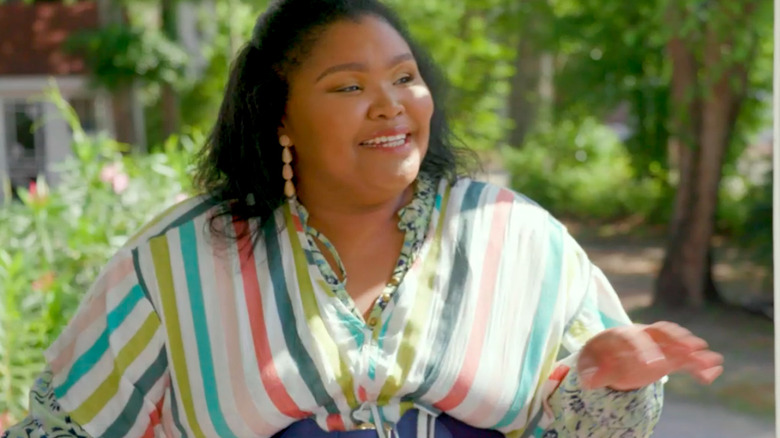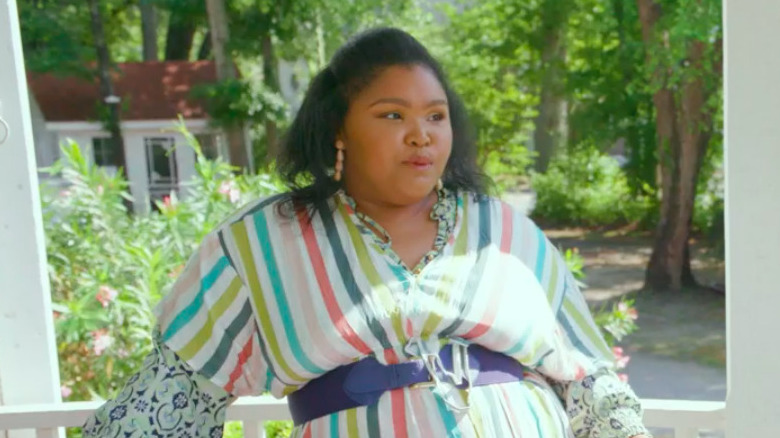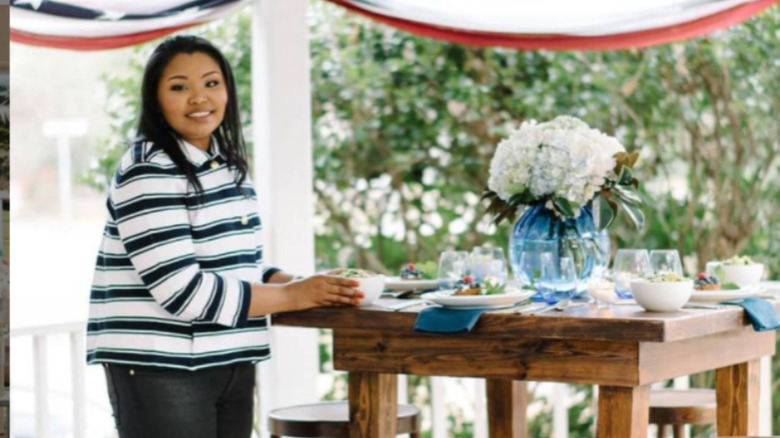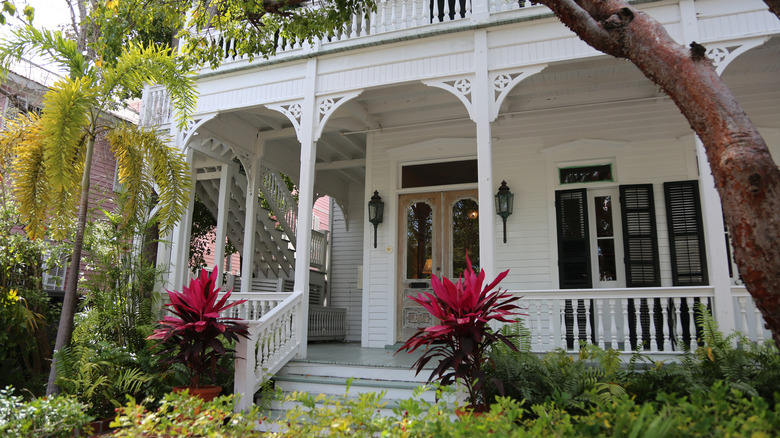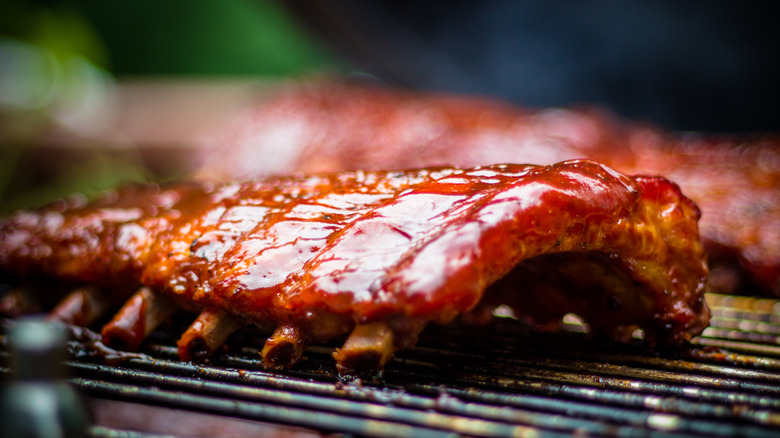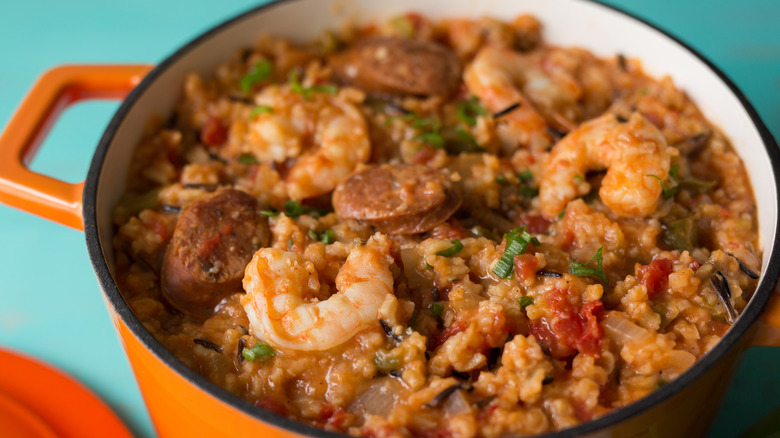The Untold Truth Of Michiel Perry
With her lifestyle brand "Black Southern Belle," Michiel Perry has captivated foodies, home design gurus, and Southern living aficionados with her approach to expressing an important yet overlooked aspect of her culture. Having left the competitive, fast-paced tech world of Google behind, Perry immersed herself into the entrepreneurial spirit and expressed what many people were longing to appreciate (via SocialMoms). Combining "African American culture and Southern themes," Perry started Black Southern Belle as a niche blog and turned it into a thriving community. Today, Black Southern Belle stands as a strong voice that looks to celebrate and promote "Southern Bred, Soul Infused" concepts.
Never afraid to stand out in a crowd, Perry appreciates that one culture does not always express the complete person. Even as she started her lifestyle brand, she wanted to express that being "Southern and stylish" applies to many people. From the decor in a home to the food on the table, those connections across cultures run deep. While Perry might have been a pioneer, she knew that there was a community waiting to have their voice heard.
Perry's success has recently led her to the Food Network, where she will be the host of their new limited web show "The Juneteenth Menu." Here's what you need to know about this food-loving lifestyle guru with a flair for all things Southern.
What does it mean to be a Black Southern Belle?
While the name might have alluded to some aspects of her lifestyle brand, Michiel Perry shared with SocialMoms that being a Black Southern Belle encompasses the characteristics of "being hospitable, valuing family, being connected to your roots, taking care of those around you." Although those terms can be broadly defined, there is a sentiment that ties them all together. From a warm welcoming seat at the table to a helping hand in times of need, the Southern woman is more than just that "bless your heart" comment. In many ways, even people from other regions have learned to appreciate that Southern way of life.
As Perry shared previously, "When people come to the site, they feel like they are coming home." Even if the word "belle" has come to be defined in other ways, Perry asks people to look to the French definition of the word. By focusing on "beauty," she invited everyone to explore the "beautiful aspects of black Southern culture" and maybe even add a little of those characteristics into their own daily lives.
Michiel Perry says being Southern isn't about a location
As Black Southern Belle grew in popularity, Perry found that her focus on Southern culture connected people beyond a particular geographic locale. While she lives in South Carolina now, Perry was actually born in the Phillippines while her father was stationed there for the military, and tells SocialMoms she tries "to find a new town to visit at least once a month."
During her SocialMoms interview, Perry shared some comments from her followers. Statements like, "I didn't know how Southern I was until I came to your site, and saw so many familiar aspects of Southern life." In some ways, that concept of "Southern" is more about the feeling of hospitality, a sense of home, and a welcoming that is undeniable.
Perry went on to share that the Southern connection can be passed down from generations, with some of her readers commenting that their Southern traditions have been passed down from mother to child. Whether that current home is in New York City, Omaha, or Savannah, it does not matter. Southern is that warm smile at the door, the open seat at the table, and the bounty of delicious food that leaves everyone satisfied.
Perry defines her style in her own way
While Southern hospitality is woven into everything that she does, Perry has a clear personal style. In a conversation with Floor Coverings International, she defined her style as "traditional eclectic." As seen in her own home, many of the design and entertaining elements blend traditional pieces with modern shapes. From antiques and brass to sleeker elements and flowing glass pieces, the juxtaposition of styles adds an exciting element.
Perry believes that living in both Washington, D.C. and Charleston has influenced her aesthetic sensibilities. While her Charleston home features historic architecture, the design is not set in the past. As seen in an interview with Post and Courier in Charleston, her house's original 1890 fireplace is surrounded by local art which can be enjoyed while sitting on a "Purple Rain" couch. For Perry, the balance of knowing who she is, where she comes from, and where she is going is woven into her style. Whatever that style is called, it is a perspective all her own.
Perry believes food can be a way to celebrate Juneteeth heritage
Juneteenth, celebrated on June 19 every year, commemorates the end of slavery and is the "longest running African American holiday," per History.com. For this year's celebration, Michiel Perry collaborated with other African American chefs and the Food Network on a web show, "The Juneteenth Menu," which will celebrate various dishes that capture this cultural celebration. Through this exploration of Lowcountry favorites, the show — which is premiering episodes through Juneteenth — celebrates "freedom and heritage" through the food on the table.
In an Eater interview, Perry said "I want people to have a greater understanding of the food history and heritage of Juneteenth while also learning about Black women chefs who are passing on the traditions and the food ways to the next generation." While the stories around the table vary, a few classic recipes featured on the show include Lowcountry staples like crab rice and okra pilau. Juneteenth celebrations often also feature red-colored foods, like barbecue ribs, watermelon, or red velvet cake. According to Wide Open Eats, red food is said to symbolize "strength, spirituality, and life and death." Although this celebration might be steeped in tradition, the food makes the story a flavorful one.
Perry showcases her Gullah heritage through celebrations
As a Lowcountry native, Perry is proud to incorporate Gullah traditions and foods into her family's celebrations. In Salon, Perry reflected on holiday traditions and her connection to Gullah heritage. She shared that her "strong connection with land and nature" is an important part of annual celebrations. Looking back at her family traditions, many parts of holiday meals featured ingredients that were cultivated on the family land, the same land that used to be her grandfather's hog farm. That food provided multiple layers of nourishment on the plate — the nourishment of a good meal, and the spiritual nourishment of connecting with one's family and culture.
In Gullah traditions, certain foods are a staple. Many dishes feature rice; Perry notes "no holiday meal is complete without it." Those common foods are then paired with the bounty from the farm. From collard greens from the garden to fresh fish from the shore, Gullah dishes take advantage of the food that is readily available. Even as recipes are adapted to the modern table, the thread that ties to the past is still strong. Just ask Michiel Perry.
